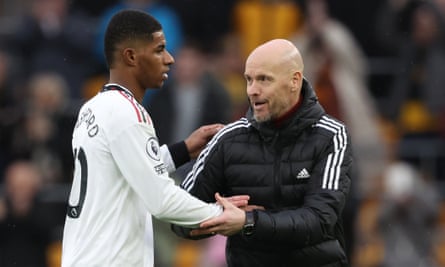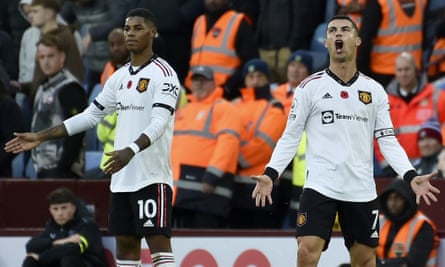[ad_1]
When picking over the Marcus Rashford renaissance, surely the feelgood story of the season, one that no football fan resents irrespective of allegiance, it is easy to linger on the biggest moments. The decisive goals for a resurgent Manchester United in the Premier League against Liverpool, Arsenal and Manchester City. The comeback strike for England at the World Cup against Iran with virtually his first touch at international level since the penalty miss in the Euro 2020 final. The two-goal salvo against Wales in the next tie, including the banging free-kick.
Rashford’s managers though, for club and country, are drawn to something else, a lower-profile flicker but one that captures his essence – the drive and clarity that has underpinned his journey from the time when United first scouted him as a six-year-old. It was the towering header against West Ham at the end of October that gave United a 1-0 home win. Christian Eriksen had stood up the cross and, when Rashford threw himself at it, Erik ten Hag could feel a glow of satisfaction.

The United manager had identified heading as an area Rashford could improve on and asked his assistant coach, Benni McCarthy, to work on it with him. “Marcus is a truly dedicated trainer and after every session he always wants to finish a series of balls on goal,” Ten Hag told Voetbal International in December. “Right foot, left foot. From different angles, from crosses. And then with those headers.”
Rashford had scored with one in United’s previous game against Sheriff in the Europa League. Now this. “The higher you go, the more it’s about the details,” Ten Hag said. “It was a great moment against West Ham.”
Gareth Southgate agreed. “I’ve seen Marcus arrive at the far post with a header, which is quite staggering,” the England manager said on the day he recalled him for his World Cup squad. Perhaps, West Ham was the point that sealed the deal. “They are the things that we’ve talked about over the years,” Southgate said. “He’s looking more like the player we’ve seen.”
Rashford’s commitment has never been in doubt. Even during his lost season last time out, the United interim manager, Ralf Rangnick, always felt he trained well. But something was blocked and there came to be the sense that the harder Rashford tried, the worse things got for him. When he crossed the white line for games, it was as if all the old certainties deserted him. Rangnick considered him an enigma. He could not explain what was happening.
Rashford told Rangnick he wanted to play off the left rather than the right but it was not one specific factor that made everything come off the rails, rather a damaging accumulation of them.
Rashford’s season had been framed by his final act of the previous one – the missed penalty in the Euro 2020 final shootout defeat against Italy and the trauma of the fallout, which was marked by racist abuse on social media. There was the shoulder surgery that meant he did not return until mid-October and by then United were in crisis, enduring the dog days of Ole Gunnar Solskjær, the Old Trafford humiliations against Liverpool and Manchester City.
Rangnick took over in early December after the brief Michael Carrick interlude but the rot was deep, United set for the worst season of their Premier League history; condemnation as the club’s worst team since the late 1980s.
When United suspended Mason Greenwood after rape allegations on 30 January, Rangnick demanded the club sign a new forward before the winter window closed only to be denied; a player in that area was not a part of the long-term plan at that point, he was told. Rangnick went crackers at the board. What the episode also tells us is that he did not see Rashford as any kind of solution.

Then there was Cristiano Ronaldo, who Rashford has described as one of his idols. “To have the opportunity to play with him is unbelievable, it’s something I can keep with me forever,” he said during the World Cup, after Ronaldo’s United contract had been terminated.
But Ronaldo’s presence last season was not always a positive for Rashford; he would sometimes have a go at him if Rashford did not get the ball to him. Rangnick felt United had to play two games – one against the opposition, the other to keep Ronaldo happy – and Rashford could be guilty of looking for impossible passes to him. The situation sapped at Rashford’s fragile confidence and the low points piled up.
Rashford heard howls of frustration from the Old Trafford crowd (previously unthinkable) but some of his performances were difficult to watch. Atlético Madrid at home, anyone? That was on 15 March and two days later Southgate named his England squad for the friendlies against Switzerland and Ivory Coast.
Everyone could see Rashford did not merit inclusion but those around him hoped Southgate could do him a favour, give him a needed boost by calling him up and sparking something. They felt Rashford would benefit from the secure environment Southgate has created with England and it probably said a lot by inference about the one in which the player was labouring at United.
Southgate omitted him and did so while making the point that Rashford had pulled out of six of the previous eight squads. Rashford was in and out of the United team. He was reportedly considering his future at the club. This was yet another setback.
The dressing room at United was fractured. There was no team spirit, no fighting for each other, no mental toughness. In his Voetbal International interview, Ten Hag described the attitude of the squad he inherited as “blase” while he remembered an episode from his second game – the 4-0 drubbing at Brentford last August.
“Beforehand, I saw one of our players shake his head and say with a sigh: ‘It is much too hot to play football,’” Ten Hag said. “I thought: ‘What is this? The opponent also suffers from it. You have to pull yourself together. You must have hardness.’ That was what was missing – that ambition. It’s purely about mentality. Brentford ran eight miles more than we did that afternoon.”
Rashford used a rare full pre-season to enter beast mode, working out from early June with a personal coach. He posted a picture on Monday – in the wake of his derby winner against City – training in only his shorts, socks and boots. The caption? “Summer ’22.” But the more important reset came on a psychological level, with Rashford admitting in October that mental health problems had been a part of it last season.

“It’s a complete different energy around the club and the training ground and that puts me in a better headspace,” he said. “I was struggling at times with more mental things. That’s the biggest difference from last season. Too often, I wasn’t in the right headspace for games. I wasn’t surprised by some of the stuff that was happening.”
Rashford has celebrated his most recent goals by pointing at his temple. He has looked freer this season, happier; the hard graft at Carrington once again transferring to matchday. Maybe, the engagement to his long-term girlfriend, Lucia Loi, after the end of last season has added to the serenity. The goals are back (it is 16 in 27 games for United); and so are the jet-heeled bursts past opponents, the silky skills.
When Rashford overslept and missed the pre-match meeting before Wolves on New Year’s Eve – an uncharacteristic lapse – Ten Hag dropped him but he came off the bench to score the winner. When he took his first penalty since the Italy final against Everton in the FA Cup this month, he scored.
And so to Arsenal on Sunday afternoon, against whom it all started for Rashford. In February 2016, Louis van Gaal gave him his league debut against them as an 18-year-old and watched him score twice in a 3-2 win. Now, as then, Rashford can sense possibility.
[ad_2]
#Rashfords #reset #full #tilt #Ten #Hag #reshapes #Uniteds #headspace
( With inputs from : www.theguardian.com )